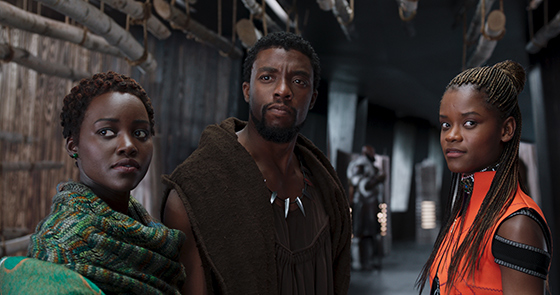Black Panther
The question of black identity and self-image in America is as complex as they come. It’s been probed by James Baldwin, Alex Haley, Spike Lee, Ava Duvernay and most recently Barry Jenkins. Now the question falls in the hands of Ryan Coogler, and it’s … complicated.

(L-R) Lupita N'yongo, Chadwick Boseman and Letitia Wright in Marvel Studios' BLACK PANTHER
“We are also mercenaries, dictators, liars. We are human, too.”
– James Baldwin
“Who are you?”
The question of black identity and self-image in America is as complex as they come. It’s been probed by James Baldwin, Alex Haley, Spike Lee, Ava Duvernay and most recently Barry Jenkins. Now the question falls in the hands of Ryan Coogler, and it’s … complicated.
BLACK PANTHER opens in a style that’s become fashionable for fantasy exposition, whereby a narrator walks us through the history of a distant or mythical place whose surroundings fell to ruin, but one hero emerges victoriously to restore his (or the people’s) dignity, etc. etc. If I hadn’t already seen it five or six other times, it might feel genuinely in its place.
For generations, Wakanda and its futuristic technologies (owing to an alien ore) have been kept secret from the world; its protector their king, whose ingestion of the heart-shaped herb gives him the strength and senses of a black panther. Now, King T’Chaka (John Kani, THE GHOST AND THE DARKNESS) has died. His son, T’Challa (Chadwick Boseman), must take the throne, but not before facing any willing challenger in open combat. You can see the beginnings of democracy, or at least constitutional monarchy, in this process.
You also see the genesis of Erik Killmonger (Michael B. Jordan). Like some of Marvel’s more nuanced villains, Killmonger is born from resentment—though not entirely misplaced. And that’s the difference. While Erik Lehnsherr (a.k.a. Magneto of the X-Men comics) carries great anger against humanity for the proliferation and atrocities of the Nazis, the modern world doesn’t continue to demean and damn him. Killmonger was abandoned in a world that despises him to protect a secret—and therein lies the strife.
Where BLACK PANTHER struggles is in the space of serving two masters. It is a movie written and directed by a black man, starring black actors, with narrative conflicts created and resolved entirely within a black community. But it is also a Marvel film. It is also a Disney film. Consequently, there’s a constant, nagging deference to action sequences. But what Coogler does right, in spite of everything working against him, is almost breath-taking in context.
Writer/director Coogler strums chords where even John Singleton failed with his disastrously-jumbled HIGHER GROUND (1995). In that film, Singelton, who struck back at racial agitprop in the year of Rodney King with BOYZ N THE HOOD, attempted to tackle so many social messages at once the film simply fell apart.
Here, Coogler hits every note. T’Challa balances the gauge of black unity against the need for tribal diversity, while also being an honest leader who accepts and faces legitimate challenges to his authority. He responds with mercy when his challenger yields, “You fought with honor. Now yield; your people need you.”
Erik confronts his issues of parental abandonment and, though consumed by his anger to the point of violence, we understand him. Undercurrents of a commentary on hyper-masculinity contrasted with nurturing leadership fuel the tension between Erik and T’Challa. The throne, not the man, is served by the Dora Milaje—female warriors as fierce as they are feminine, smart, and several shades darker than Scott Rudin would prefer.
And that cast! Lupita N’yongo as Nakia, a spy deep-undercover rescuing Wakandan women from human trafficking; that she’s T’Challa’s ex is secondary. Okoye (Danai Gurira), his top general. Daniel Kaluuya (from last year’s brilliant social commentary, GET OUT) as W’Kabi, a cavalry commander. Sterling K. Brown as N’Jobu, a spy sent to Oakland, CA, to track illicit sales of vibranium. Forest Whitaker as the shaman, Zuri.
John Kani is a kinder, gentler King. Only Angela Bassett could riff off Madge Sinclair’s stately Queen Aeoleon. The standout, however, is Letitia Wright as Shuri—T’Challa’s defiantly ingenious, wisecracking sister and Q to his James Bond. Not by coincidence, Ludwig Göransson’s score, when it’s not echoing Herbie Hancock’s Watermelon Man, riffs off Nile Rodgers’ regal horns and strings that herald King Jaffe Joffer’s arrival in the United States in COMING TO AMERICA. Shot by Rachel Morrison, the off-axis close-ups of Wakandan warriors’ gorgeous ebony faces rim-lit by sun-drenched vistas make one occasionally forget this is a Marvel film.
The film also deals frankly with the perilous foreign policy of isolationism—as pertinent to us as a nation as it is to minorities in particular. Here, Wakanda calls upon the support of a foreign government, and the whitest of white people, Martin Freeman. The appeal made to stop a war fueled by white arms dealers is not to CIA Agent Ross, but to combat veteran and skilled Air Force pilot Ross. Coogler’s, his characters’, and black people’s capacity for self-reflection and empathy lies in stark contrast to the caricatures painted by bigots. As Roger Ebert noted in his 2001 retrospective of Spike Lee’s DO THE RIGHT THING, it was remarkable as “a movie about race in America that empathized with all the participants.”¹
Spike, let’s face it, invented the black superhero origin story with MALCOLM X, a film that tells us how Malcolm Little discovered the answer to the question, “Who am I?” Lee’s film concludes with schoolchildren declaring one after another, resolutely, “I AM MALCOLM X.”
This film concludes with another Little, Alex Hibbert from Barry Jenkins’ MOONLIGHT, asking by proxy the same question.
- Maybe that is or isn’t more empathy than they deserve, but that’s for black filmmakers and critics to comment upon.